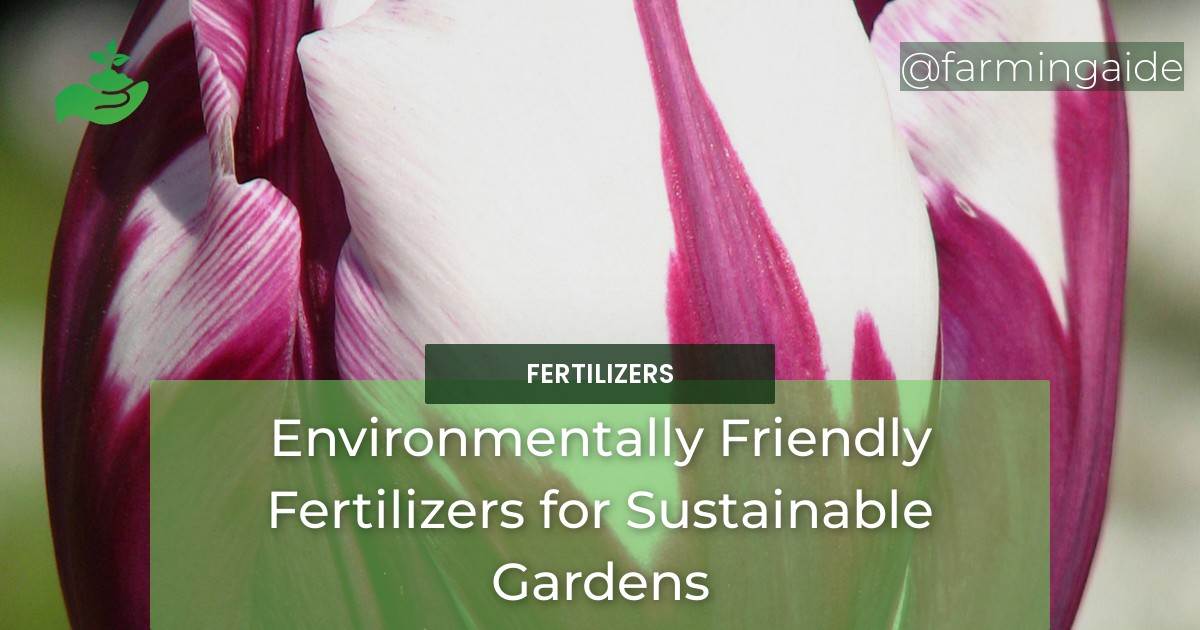For garden enthusiasts, the process of fertilizing their plants can be a daunting and confusing task. With so many options available in the market, it can be challenging to determine the best type of fertilizer for your garden that is also environmentally friendly.
In this article, we will explore the topic of environmentally friendly fertilizers for sustainable gardens. Our comprehensive guide will cover everything from the different types of eco-friendly fertilizers to the benefits of sustainable fertilization. We will also provide tips for reducing environmental impact and choosing the best eco-friendly fertilizer for your garden. So, let’s dive in and learn more about how to create a beautiful and thriving garden while also protecting the environment.
Table of Contents
Eco-Friendly Fertilizer Options
When it comes to choosing an environmentally friendly fertilizer for your garden, there are several options to consider. Here are some of the most popular types:
Organic Fertilizers
Organic fertilizers are derived from natural sources such as animal waste, plant matter, and minerals. They are often slow-release, which means they release nutrients over time, providing long-lasting benefits to your plants. Some examples of organic fertilizers include compost, manure, and bone meal.
Synthetic Fertilizers
Synthetic fertilizers are manufactured chemically, and their composition can be tailored to meet specific plant nutrient requirements. However, they can be harmful to the environment if not used correctly. Synthetic fertilizers can leach into groundwater or runoff into nearby water bodies, causing pollution and harm to aquatic life.
Slow-Release Fertilizers
Slow-release fertilizers are designed to release nutrients at a slower and more controlled rate, reducing the risk of over-fertilization and nutrient loss. These fertilizers are an excellent option for container gardening, as they can provide a consistent nutrient supply for an extended period.
Natural Soil Amendments
Natural soil amendments are materials added to the soil to improve its structure, fertility, and water-holding capacity. Common examples include peat moss, vermiculite, and perlite.
Benefits of Sustainable Fertilizers
Using sustainable fertilizers in your garden offers several benefits, including:
Improve Soil Health and Fertility
Sustainable fertilizers contain organic matter that improves soil structure, increases water-holding capacity, and promotes the growth of beneficial microorganisms. This leads to healthier, more productive soil that can support vigorous plant growth.
Enhance Plant Growth and Yield
The nutrients in sustainable fertilizers provide the essential building blocks for plant growth and development. By providing the right balance of nutrients, plants can grow more robust, healthier, and produce greater yields.
Reduce Chemical Exposure and Toxicity
Traditional fertilizers can be harmful to the environment and human health due to their chemical composition. Sustainable fertilizers, on the other hand, are made from natural sources and do not contain harmful chemicals, reducing the risk of chemical exposure and toxicity.
Promote Biodiversity and Ecosystem Balance
Sustainable gardening practices, including the use of eco-friendly fertilizers, promote biodiversity and ecosystem balance. By supporting healthy soil and plant growth, you can help attract beneficial insects and wildlife to your garden.
ALSO READ
Reducing Environmental Impact through Responsible Fertilization
While using eco-friendly fertilizers is an excellent step towards reducing your environmental impact, responsible fertilization practices are equally important. Here are some tips to reduce the environmental impact of fertilization:
Proper Application Techniques
Follow the instructions on the fertilizer package and apply the product evenly and at the recommended rate. Over-fertilization can lead to nutrient runoff and pollution of nearby water bodies.
Controlled Release of Nutrients
Slow-release fertilizers are an excellent option for reducing nutrient loss. Consider using fertilizers that release nutrients over time, instead of all at once.
Soil Testing and Analysis
By testing your soil, you can determine its nutrient content and pH level. This information can help you choose the best eco-friendly fertilizer for your garden and avoid over-fertilization.
Composting and Waste Reduction
Composting is an excellent way to reduce waste and create a nutrient-rich soil amendment for your garden. Use food scraps, yard waste, and other organic materials to create compost, which can help reduce the need for synthetic fertilizers.
Choosing the Best Eco-Friendly Fertilizer for Your Garden
Choosing the best eco-friendly fertilizer for your garden can be challenging. Here are some factors to consider:
Consider Soil Type and pH
Some fertilizers may be better suited for certain soil types or pH levels. For example, acidic soils may require lime to balance the pH level.
Evaluate Plant Nutrient Requirements
Different plants require specific nutrients to grow and thrive. Research the nutrient requirements of the plants in your garden and choose a fertilizer that provides the necessary nutrients.
Determine Application Frequency and Rate
Applying fertilizer too frequently or at a higher rate than recommended can lead to over-fertilization and environmental harm. Follow the instructions on the fertilizer package and apply the product at the recommended rate and frequency.
Research Product Ingredients and Sourcing
When choosing an eco-friendly fertilizer, research the product’s ingredients and sourcing. Look for products made from sustainable and organic sources and avoid those with harmful chemicals or synthetic additives.
ALSO READ
Examples of Environmentally-Friendly Fertilizers
There are several eco-friendly fertilizers available in the market. Here are some examples:
- Compost
- Manure
- Fish emulsion
- Seaweed extract
- Bone meal
Conclusion
In conclusion, using environmentally friendly fertilizers is an essential step towards creating a sustainable garden. By choosing the right fertilizer and using responsible fertilization practices, you can reduce your environmental impact and support healthy soil and plant growth. We encourage all gardeners to choose eco-friendly fertilizers and help protect our planet for future generations.


